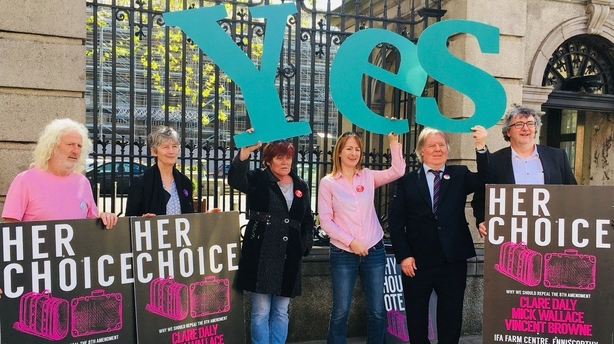A campaigner on transparency issues has said social media companies including Google and Facebook are self-regulating advertising on the referendum on the Eighth Amendment in the absence of proper policy by the Government.
Gavin Sheridan, CEO of Vizlegal, said social media companies were in reactive mode and it should not be their job to police advertising.
Speaking on RTÉ’s Morning Ireland, Mr Sheridan said the problem has essentially been "outsourced" to the companies as Ireland has no fundamental policy to govern digital advertising, despite the fact that the lack of oversight has been known for some time.
He said a gap in legislation on how to govern advertising - and allow an equal playing field for elections - should have been dealt with long ago.
Speaking on the same programme, TJ McIntyre, a law lecturer in UCD and chair of Digital Rights Alliance said the steps taken in the referendum by Google and Facebook could act as a blueprint for how they will behave internationally going forward.
He said it was particularly important given Ireland is the European headquarters for Google and Facebook.
Mr McIntyre said the decision restricts the ability of a "disproportionately well-funded side" to set the terms of the debate.
He said regulation in Ireland governs donations rather than expenditure on advertising, but this does not limit spending by groups outside of Ireland.
Mr McIntyre agreed corporate decisions like this may limit debate.
Meanwhile, the leader of Renua Ireland, the only political party to campaign for the retention of the Eighth Amendment, has noted that the decisions by Facebook and Google have occurred in "the dying weeks of the campaign".
Offaly-based Councillor John Leahy has said it sets "a dangerous precedent for future campaigns where Google and Facebook again decide how much and what information the people have."
In a statement issued last night, Mr Leahy also said there can be an over-emphasis on the role of social media during campaigns.
Mr Leahy stressed the effectiveness of "the old fashioned ground war of meeting the people on a face to face basis".

The Independents 4 Change group have launched their campaign calling for a Yes vote in the referendum.
TD Clare Daly, who first moved legislation in 2012 to extend abortion provision in Ireland, said Irish people finally have an historic opportunity "to right the wrong and remove women’s bodies from the Constitution".
Ms Daly said that since 2012, many politicians have "gone on a journey" and that was seen when Oireachtas Eighth Amendment Committee members heard medical and legal evidence.
"What's really changed things", she said, "is all of those extraordinary people who have told their private stories, who have come out in the open and acknowledged their abortion reality which is Ireland's abortion reality, and the only decent and dignified response is to provide that healthcare at home"
Asked about voters who are concerned about future governments legislating on the matter, Ms Daly said there is no contradiction between those who are undecided or who are against abortion in those who will be voting Yes, because she said it is about enabling women "to make up their own decision".
People Before Profit has highlighted the issue of abortion pills outside Leinster House.
Holding a box of abortion pills, TD Bríd Smith said she was highlighting the fact that a woman who takes the pills could be given a 14 year prison sentence as stipulated under the Protection of Life During Pregnancy Act 2013.
She said people should vote Yes in the referendum to give women legal access to safe abortion services in Ireland, with the necessary medical provisions.

